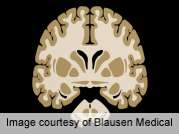White matter measure predicts longer concussion recovery

(HealthDay)—A measure of white matter in the brain, particularly in males, is an independent predictor of longer time to symptom resolution (TSR) after mild traumatic brain injury (mTBI), according to a study published in the September issue of Radiology.
Saeed Fakhran, M.D., from the University of Pittsburgh, and colleagues assessed diffusion-tensor imaging in 69 patients with mTBI (47 male and 22 female patients) and 21 control subjects (10 males and 11 females) whose conventional magnetic resonance images were normal. Fractional anisotropy maps were used as a measure of white matter integrity. Serial neurocognitive testing with Immediate Post-Concussion Assessment and Cognitive Testing was performed in mTBI patients.
The researchers found that compared with female patients with mTBI and control subjects, male patients with mTBI had significantly lowered fractional anisotropy values in the uncinate fasciculus bilaterally (P < 0.05). Male mTBI patients also had a significantly longer TSR (P = 0.04). Sex and uncinate fasciculus fractional anisotropy values were independently correlated with >3-month TSR (adjusted odds ratios [OR], 2.27 and 2.38; P = 0.04 and P < 0.001, respectively), but initial symptom severity was not (adjusted OR, 1.15; P = 0.35).
"Relative sparing of the uncinate fasciculus is seen in female compared with male patients after mTBI, with sex and uncinate fasciculus fractional anisotropy values as stronger predictors of TSR than initial symptom severity," the authors write.
More information:
Abstract
Full Text (subscription or payment may be required)
Copyright © 2014 HealthDay. All rights reserved.











